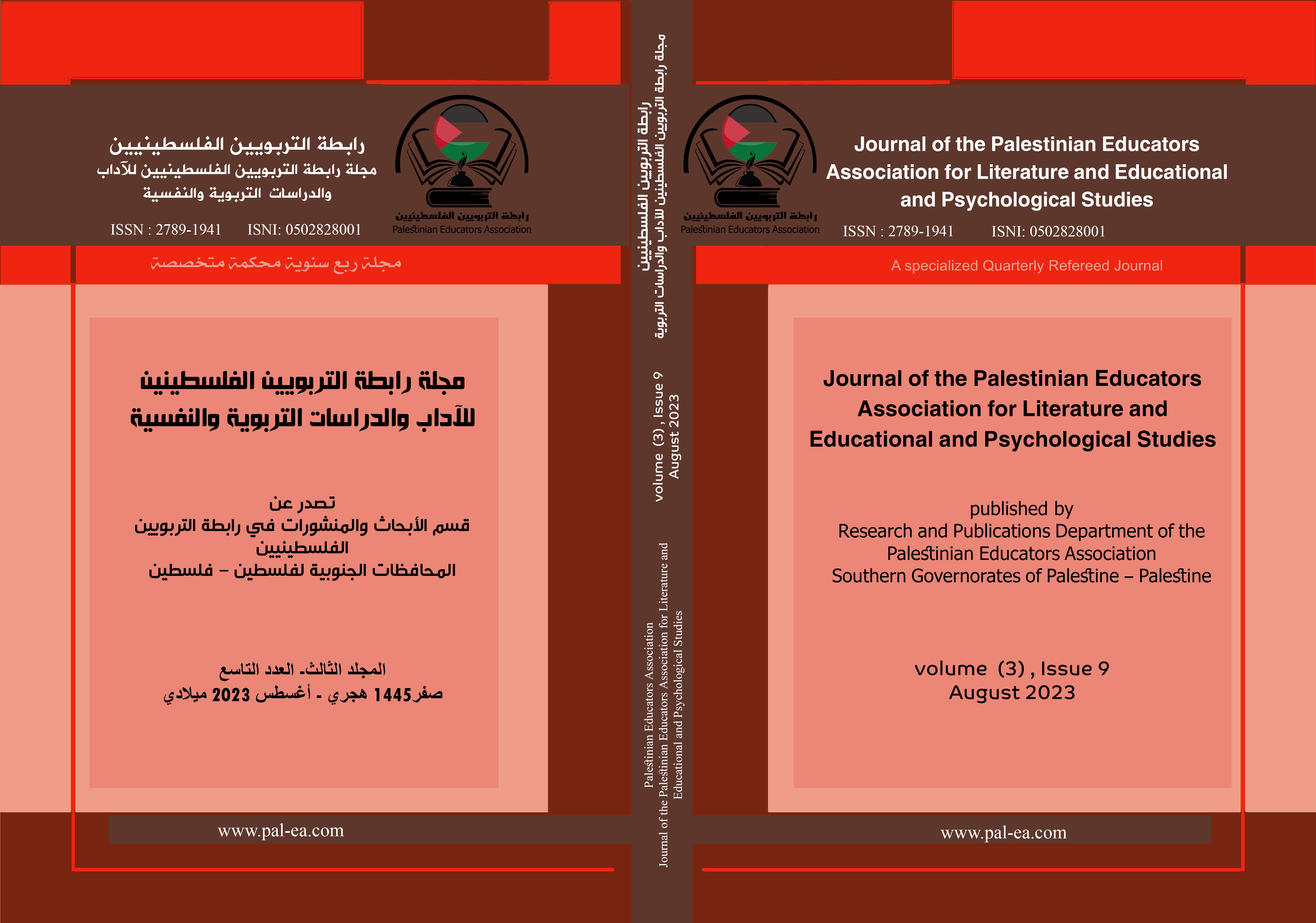The role of creative education among public school teachers in achieving sustainable development (A field study))
Keywords:
Creative education- Teachers in government schools- Sustainable developmentAbstract
The study aimed to identify the role of creative education among teachers in achieving sustainable development, and to detect differences in the estimates of the study sample for the role of creative education in achieving sustainable development according to the variable: (social gender, educational qualification, number of years of service), and to achieve the objectives of the study, the researcher Using the descriptive analytical approach, the study sample consisted of (255) male and female teachers from government schools in the northern governorates of Palestine, and the researcher prepared the study tools represented by the questionnaire, and the study reached the following results: And the absence of statistically significant differences in the estimates of the study sample of the role of creative education in achieving sustainable development due to the gender variable, with the exception of the dimension of cooperation and interaction, the differences were in favor of females, and the presence of statistically significant differences in the estimates of the study sample of the role of creative education in achieving sustainable development due to For the educational qualification variable, except after encouraging innovation, there were no statistically significant differences.
Downloads
References
المصادر والمراجع
أولاً: المراجع العربية:
أحمد، شريفة (2020). استراتيجية مقترحة لدور المدرسة الابتدائية في تفعيل التربية الإبداعية لدى تلاميذها بمحافظة أسوان. مجلة البحث في التربية وعلم النفس، 35(4): 119 -170.
البحراوي، سيد (2018). دليل الباحثين في قراءة نتائج التحليل الاحصائي باستخدام برنامج SPSS وكيفية التعليق على النتائج. الطبعة الأولى، الدار الجامعية: مصر.
البرجاوي، مولاي (2015). الإبداع والتربية الإبداعية (https://www.alukah.net/social).
بولمكاحل، ليندا (2022). التربية الإبداعية: قراءة تحليله في المفهوم والمتطلبات. مجلة العلوم الإنسانية، 33 (2): 399-410.
حسانين، عواطف (2021). التربية الإبداعية مطلب أساسي لشباب الجامعات وتنمية للمجتمع. المجلة التربوية، 91: 3710 -3730.
حسانين، عواطف (2021). التربية الإبداعية مطلب أساسي لشباب الجامعات وتنمية المجتمع. المجلة التربوية جامعة سوهاج، الجزء الأول: 3710-3730.
حسن، محمد و البردويلي، فاطمة ومحمد، هالة (2022). دور الأنشطة المدرسية في تحقيق التربية الإبداعية لتلاميذ المرحلة الإعدادية. مجلة العلوم التربوية، 51 (51): 216-240.
العيسي، على (2023). التنمية المستدامة للمعلمين في بعض الدول الغربية وكيفية الاستفادة منها في تطوير أداء معلمي المدارس السعودية: تصور مقترح. مجلة البحث في التربية وعلم النفس، 38(2): 151-206.
المجالي، سوسن (2019). واقع التربية الإبداعية لمعلمي المدارس الثانوية الحكومية في محافظة الزرقاء. مجلة المنارة، 26 (1): 101-121.
مريحيل، توفيق (2013). التربية الإبداعية ضرورة تعليمية كمدخل لعصر التميز والإبداع. عالم التربية، 14(41):215 – 260.
الهمص، عبد الفتاح (2016). مقومات البيئة الصفية لتعزيز التربية الإبداعية للطالب الفلسطيني في المرحلة الثانوية بالمدارس الحكومية. مجلة التربية، (170)، الجزء الأول: 390 -426.
والي، محمد (2023). دور التكنولوجيا الحديثة في تحقيق التنمية المستدامة في ضوء رؤية مصر 2030. مؤسسة أكاديميا جلوب للبحث العلمي والنشر الدولي، 2(1): 1-21.
ثانياً: المراجع العربية الأجنبية
Ahmed, Sh .(2020). A proposed strategy for the role of primary school in activating creative education among its students in Aswan Governorate (in Arabic). Journal of Research in Education and Psychology, 35(4): 119-170.
Al-Eisi, A .(2023). Sustainable development for teachers in some Western countries and how to benefit from it in developing the performance of teachers in Saudi schools: a proposed vision (in Arabic). Journal of Research in Education and Psychology, 38(2): 151-206.
Al-Hams, A. F .(2016). Elements of the classroom environment to enhance the creative education of Palestinian students at the secondary stage in public schools (in Arabic). Education Journal, (170), Part One: 390-426.
Berjaoui, M .(2015). Creativity and Creative Education (in Arabic) (https://www.alukah.net/social).
Bolmkahel, L .(2022). Creative education: read his analysis of the concept and requirements (in Arabic). Journal of Human Sciences, 33 (2): 399-410.
El Bahrawy, S .(2018). A guide for researchers to read the results of statistical analysis using the SPSS program and how to comment on the results (in Arabic). First edition, University House: Egypt.
Hassan, M & Al-Bardawli, F & Mohamed, H .(2022). The role of school activities in achieving creative education for middle school students (in Arabic). Journal of Educational Sciences, 51 (51): 216-240.
Hassanein, A .(2021). Creative education is a basic requirement for university youth and community development (in Arabic). Educational Journal, 91: 3710-3730.
Majali, S .(2019). The reality of creative education for public secondary school teachers in Zarqa Governorate (in Arabic). Al-Manara Journal, 26 (1): 101-121.
Merheel, T.(2013). Creative education is an educational necessity as an entry point for the era of excellence and creativity (in Arabic). World of Education, 14 (41): 215-260.
Wali, M.(2023). The role of modern technology in achieving sustainable development in the light of Egypt's Vision 2030 (in Arabic). Academia Globe Foundation for Scientific Research and International Publishing, 2 (1): 1-21.
ثالثاَ: المراجع الأجنبية:
Kuo, H. C., Burnard, P., McLellan, R., Cheng, Y. Y., & Wu, J. J. (2017). The development of indicators for creativity education and a questionnaire to evaluate its delivery and practice . Thinking Skills and Creativity, 24, 186-198.
Downloads
Published
Issue
Section
License

This work is licensed under a Creative Commons Attribution-NonCommercial-ShareAlike 4.0 International License.
The Journal of the Palestinian Educators Association for Literature, Educational and Psychological Studies
E-issn: 2789-1941
Authors retain Copyright
The Journal of the Palestinian Educators Association for Literature, Educational and Psychological Studies allows Authors retain Copyright and grant the journal right of first publication with the work simultaneously licensed under a Creative Commons Attribution (CC-BY) 4.0 License that allows others to share the work with an acknowledgment of the work’s authorship and initial publication in this journal.
Provided they are the owners of the Copyright to their work, authors are able to enter into separate, additional contractual arrangements for the non-exclusive distribution of the journal’s published version of the work (e.g., post it to an institutional repository, in a journal or publish it in a book), with an acknowledgment of its initial publication in this journal.
Authors are permitted and encouraged to post their work online (e.g., in institutional repositories, disciplinary repositories, or on their website) prior to
and during the submission process.










